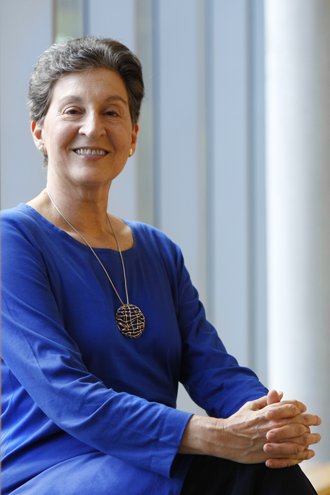Documents from Dead Sea Scrolls era show diversity of women’s roles
 Photo/Mike Lovett
Photo/Mike LovettBernadette J. Brooten
Ancient documents written around the time of the Dead Sea Scrolls paint a lively picture of the positions of power and influence held by some Jewish and Christian women.
So says Bernadette J. Brooten, the Kraft-Hiatt Professor of Christian Studies, of women’s and gender studies, of classical studies, and of religious studies at Brandeis, who skillfully wove together evidence from inscriptions, papyri and other sources to show that women in traditional cultures often held very nontraditional roles, in a lecture she presented on Oct. 2 at the Museum of Science, Boston.
Brooten’s presentation is just one example of how Brandeis’ educational participation in the Museum of Science’s exhibition “Dead Sea Scrolls: Life in Ancient Times” has expanded well beyond a scriptural focus to consider issues related to ancient social structure and women’s roles.
One document showing a Jewish woman’s registration of her date orchards near the Dead Sea in 127 C.E. indicates that women could own property, Brooten said. Another document from the early second century details a Jewish woman’s divorce from her husband, often believed to be impossible under the law at the time.
In the Christian culture, women could be called apostles, and could baptize others, teach, preach, serve as elders and bishops, and write about Christianity.
Jewish and Christian women were even permitted to own slaves, giving them a basis for community leadership and enabling safe travel. An inscription from Turkey refers to a female head of a synagogue who owned slaves.
Of course, slave ownership meant that woman had to navigate the moral ambiguity of enslavement just as men did, said Brooten, who cited the story of an early Christian woman who preserved her sexual purity by giving her pagan slave woman to her husband, and a Christian church law that only lightly punished a woman who flogged a slave woman to death.
Sources from the same period indicate that women could — and did — marry other women, although these unions were not legally recognized. While acknowledging some controversies over sources and translations, Brooten presented a compelling argument that women could designate female partners as wives.
Some Christian and Jewish sources, said Brooten, disavowed same-sex marriage as an Egyptian practice. “Historians know that prohibition of a behavior means that it occurred and was noticed,” she explained. “These and other ancient authors who refer to woman-woman marriage were talking about a known, albeit marginal, phenomenon, meaning that celibacy was not the only way to challenge gender roles.”
Advocating for broader and deeper scholarship on the Dead Sea Scrolls era, Brooten noted, “We need to interrogate new sources, ask new questions of known sources, and make new connections between Jewish and Christian sources of the time.”
Categories: Arts, Humanities and Social Sciences, International Affairs, Research





